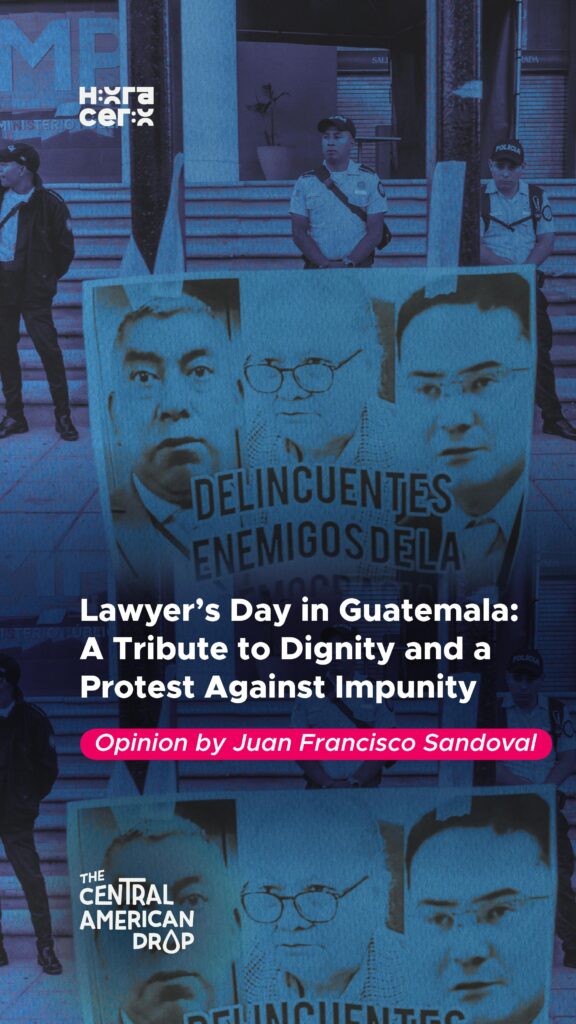
I’m not thinking about the empty speeches or the ceremonial ceremonies. I’m thinking about Stuardo Campo, arbitrarily imprisoned for fulfilling his duty to investigate corruption. I’m thinking about Virginia Laparra, deprived of her liberty for daring to apply the law independently.
I think of Thelma Aldana, Erika Aifán, Miguel Ángel Gálvez, Leily Santizo, Siomara Sosa, and all my brave colleagues from the former FECI who now live in exile, far from their land and their people, solely for defending the ideals of justice and democracy.
I also think of Claudia González, who, despite remaining in Guatemala, bravely faces persecution and harassment for having taken up the defense of those criminalized for fighting corruption.
This day belongs to them. Because they have demonstrated that being a lawyer in Guatemala is not simply a professional practice, but an act of resistance and dignity. Because with their lives, not just with their words, they remind us that the legal profession must serve the common good and never be in favor of corruption.
But I must also be clear: not everyone deserved praise. Guatemala has seen how certain lawyers have used their intellect, knowledge, and cunning not to protect the most vulnerable but to shield criminal organizations, manipulate processes, and guarantee impunity for those who have plundered the country.
In many of these cases, their actions are not only due to a lack of ethics but also to deficiencies in their legal training. Legal education in Guatemala continues to suffer from gaps that result in professionals lacking social commitment, with limited knowledge and a narrow view of the legal profession as a business or a springboard to power. This academic and moral precariousness ultimately becomes complicit in impunity.
Lawyers’ Day was not, for me, an empty celebration. It was a moment to honor those who today pay a high price for remaining faithful to justice. It was also a time to reaffirm my repudiation of those who, from the comfort of power or convenience, have put their knowledge, often insufficient and misguided, at the service of impunity.
Amidst so much pain and persecution, I cling to the certainty that there are still lawyers who fight with dignity, who do not renounce their principles, even if it means imprisonment, persecution, or exile. They are the true hope for a different country.
May Lawyers’ Day in Guatemala not just be a celebration, but a reminder: the law cannot be neutral in the face of corruption or injustice. It either serves dignity or becomes complicit in impunity.
Therefore, I celebrate and embrace my colleagues who resist, who, from prison or exil,e continue to honor the profession. And, at the same time, I raise my voice to denounce those who betrayed their oath, turned the legal profession into an instrument of corruption, and also expose the serious shortcomings of a legal training system that urgently needs to be transformed.
Because in Guatemala, more than ever, being a lawyer means choosing between dignity and impunity. And to encourage more lawyers to choose the former, we must guarantee professional training that is commensurate with the justice our country demands.

| Cookie | Duración | Descripción |
|---|---|---|
| cookielawinfo-checkbox-analytics | 11 months | This cookie is set by GDPR Cookie Consent plugin. The cookie is used to store the user consent for the cookies in the category "Analytics". |
| cookielawinfo-checkbox-functional | 11 months | The cookie is set by GDPR cookie consent to record the user consent for the cookies in the category "Functional". |
| cookielawinfo-checkbox-necessary | 11 months | This cookie is set by GDPR Cookie Consent plugin. The cookies is used to store the user consent for the cookies in the category "Necessary". |
| cookielawinfo-checkbox-others | 11 months | This cookie is set by GDPR Cookie Consent plugin. The cookie is used to store the user consent for the cookies in the category "Other. |
| cookielawinfo-checkbox-performance | 11 months | This cookie is set by GDPR Cookie Consent plugin. The cookie is used to store the user consent for the cookies in the category "Performance". |
| viewed_cookie_policy | 11 months | The cookie is set by the GDPR Cookie Consent plugin and is used to store whether or not user has consented to the use of cookies. It does not store any personal data. |